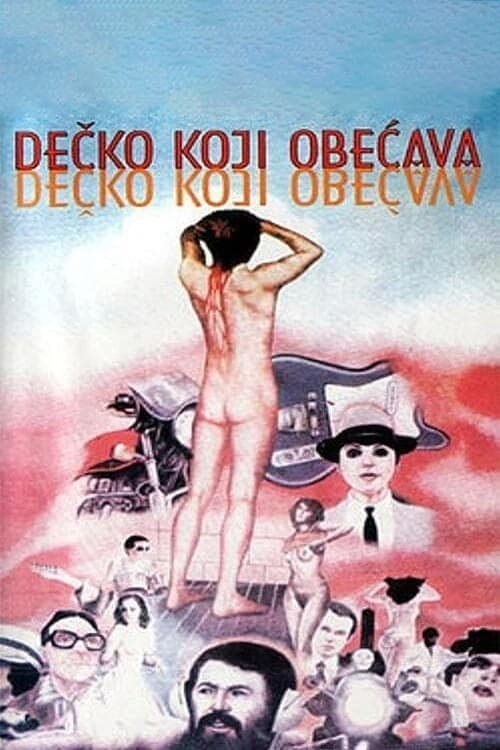Film Review: The Promising Boy (Dečko koji obećava, 1981)

Early 1980s were rather grim and depressive times in Yugoslavia due to economic woes that would escalate and decade later contribute to the violent collapse of the country. Yet, even that dark period had something that would become object of nostalgia among certain segments of population – fans of New Wave music. Sudden proliferation and popularity of imaginative and often iconoclastic New Wave bands is phenomenon that affected even Yugoslav cinema industry, most notably in The Promising Boy, 1981 drama directed by Miloš “Miša” Radivojević, film which enjoys cult status among fans of Yugoslav New Wave music.
The plot actually has little to do with the music directly, at least when it starts. The protagonist, played by Aleksandar Berček, is Slobodan Milošević, young man who lives in Belgrade and enjoys all the privileges that come with family that belongs to the ruling Communist elite. His father (played by Rade Marković) is high ranking Yugoslav People’s Army officer, while his mother (played by Dušica Žegarac) is university professor. He is supposed to follow their footsteps by studying medicine at Belgrade University and his fiancee Maša (played by Dara Džokić) belongs to the same circles. Slobodan is model son and model student who tries to do everything right, even frustrating Maša who appears to be more sexually adventurous in their relationship. Everything changes after chance meeting young Swiss woman (played by Eva Dalan) who visited Yugoslavia in order to study Serbian monasteries. She easily seduces Slobodan and has sex with him in hotel, but this tryst doesn’t sit well with Maša who reacts by hitting Slobodan in head with an oar. This results in complete change of Slobodan’s personality, namely in him suddenly feeling liberated and unrestrained by his family’s expectations and social conventions. This reflects in scandalous behaviour that includes having sex with Maša’s mother (played by Milena Župančič). He also abandons studies in order to pursue career of punk musician, being mentored by his good friend Pit (played by Branko Kojić, frontman of Disciplina kičme rock band). This rebellion, however, ends after he suffers another accident that would result in retaining his “normalcy” and marrying Maša.
A decade after the premiere The Promising Boy began to be seen in rather macabre light due to its protagonist sharing the name with Slobodan Milošević, Serbian leader whose policies would play large role in collapse of Yugoslavia and ensuing bloodbath. Many began to view film as some sort of allegorical prophecy with Aleksandar Berček’s physical resemblance to Milošević. Radivojević and his scriptwriters Nebojša Pajkić and Bogdan Tirnanić have spent decades trying to deny those claims, pointing out that Milošević is actually relatively common last name in Serbia and Yugoslavia. Name Slobodan was chosen because it literally means “free” in Serbian, which is the word closely associated with the general theme of the plot and repeatedly mentioned in lyrics of one of the punk songs performed by Berček. The Promising Boy, despite being set in upper class milieu of Communist Yugoslavia, deals with more generic issues of youthful rebellion and conflicts between unrestrained individualism and suffocating social conformity. Those same issues were explored in earlier films like Nicholas Ray’s Rebel Without Cause that Radivojević took as his inspiration. New Wave and punk music this appears in the film is just convenient expression of the rebellion.
The problem for The Promising Boy is, however, in often plot which is often confusing, not particularly convincing and Radivojević lacking discipline during its direction. Soundtrack featuring songs of the most popular bands of the period, like Šarlo Akrobata, Azra, Prljavo kazalište, Igra staklenih perli and VIS idoli, is supposed to function as some sort of Greek chorus, but this probably won’t work to audience unfamiliar with the language and specific cultural and political conditions of early 1980s Yugoslavia. The ending is somewhat confusing and makes the whole film look pretentious. Despite those flaws, Radivojević should be commended for the enthusiasm, and same can be said of the cast that gives spirited performances to sometimes underwritten roles. Although it should be best recommended to rather limited set of nostalgic viewers, The Promising Boy represents important time capsule that could only gain in importance for future historians.
RATING: 6/10 (++)
_
Blog in Croatian https://draxblog.com
Blog in English https://draxreview.wordpress.com/
InLeo blog https://inleo.io/@drax.leo
InLeo: https://inleo.io/signup?referral=drax.leo
Unstoppable Domains: https://unstoppabledomains.com/?ref=3fc23fc42c1b417
Hiveonboard: https://hiveonboard.com?ref=drax y
Bitcoin Lightning HIVE donations: https://v4v.app/v1/lnurlp/qrcode/drax
Rising Star game: https://www.risingstargame.com?referrer=drax
1Inch: https://1inch.exchange/#/r/0x83823d8CCB74F828148258BB4457642124b1328e
BTC donations: 1EWxiMiP6iiG9rger3NuUSd6HByaxQWafG
ETH donations: 0xB305F144323b99e6f8b1d66f5D7DE78B498C32A7

Never watched this one, but I hope to see it some day soon. Thanks for your review!